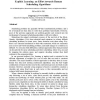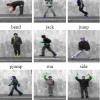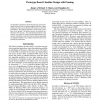992 search results - page 139 / 199 » Evolutionary Learning Using a Sensitivity-Accuracy Approach ... |
121
Voted
CORR
2008
Springer
15 years 2 months ago
2008
Springer
Scheduling problems are generally NP-hard combinatorial problems, and a lot of research has been done to solve these problems heuristically. However, most of the previous approach...
164
Voted
CVPR
2009
IEEE
16 years 9 months ago
2009
IEEE
We present a new method for classification with structured
latent variables. Our model is formulated using the
max-margin formalism in the discriminative learning literature.
We...
125
click to vote
GECCO
2007
Springer
15 years 8 months ago
2007
Springer
A significant problem for evolving artificial neural networks is that the physical arrangement of sensors and effectors is invisible to the evolutionary algorithm. For example,...
101
click to vote
FLAIRS
2004
15 years 3 months ago
2004
An algorithm is proposed to prune the prototype vectors (prototype selection) used in a nearest neighbor classifier so that a compact classifier can be obtained with similar or ev...
114
click to vote
JMLR
2006
15 years 2 months ago
2006
We develop kernels for measuring the similarity between relational instances using background knowledge expressed in first-order logic. The method allows us to bridge the gap betw...




